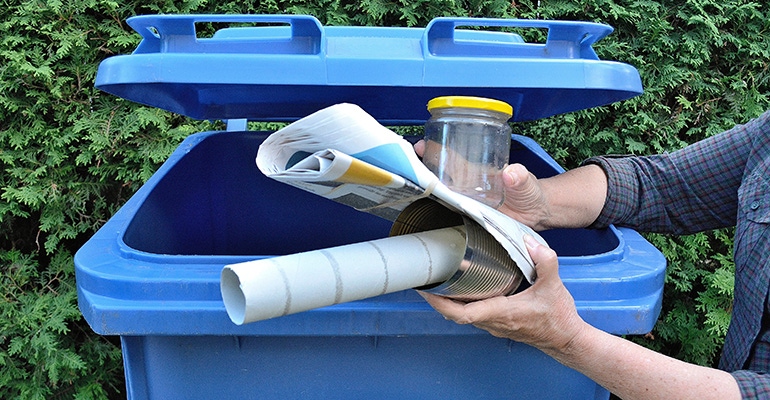Last week Portland, Maine, began the process of handing out approximately 25,000 mostly 64-gallon wheeled carts to residents.

With help from The Recycling Partnership, the city of Portland, Maine, is rolling out recycling carts with the goal of decreasing litter and increasing its recycling rate. Last week, the city began its implementation of 64-gallon covered recycling carts.
On Tuesday, the city began the process of handing out approximately 25,000 mostly 64-gallon wheeled carts to residents. Multifamily residences will receive 94-gallon carts.
The process is off to a pretty good start, according to Portland Sustainability Coordinator Troy Moon
“Most people are excited to see them,” Moon says. “It will take a little getting used to for some people but most of the reaction has been pretty positive.”
Residents have been asking for a lidded container quite some time, largely because of litter, he says. Residents had been using the small 18-gallon blue recycling bins provided by the city in 1999. Now, with single stream recycling and a little more experience, the bins were not doing the job.
As the city began looking at the litter issue in Portland, it found support through The Recycling Partnership. In addition to the new carts, Portland has also banned polystyrene and charges fees for using plastic bags.
In the United States, approximately $11.5 million annually is spent to clean up litter, according to Keep America Beautiful, a non-profit litter prevention group. Communities pay for litter abatement, education and cleanup. Some estimates say that as much as 9 billion tons of litter end up in the oceans.
“Each year we supply an annual round of cart-grant funding,” says Justin Gast, technical assistance specialist for the Recycling Partnership. “Thanks to our many generous funders. This year, Portland, Me., was one of the cities we worked with based on funding we had provided for them at the end of 2016. We gave them $200,000 toward purchase of the carts and for educational needs associated with their campaign.”
The full cost of the carts is a million dollars, adds Moon. The Recycling Partnership grant provides for about $175,000 toward the carts. The city is covering the remainder of the costs, so residents will not be charged, he says.
And the goal is to stop the litter and increase the recycling rate. In fact, Gast says every community The Recycling Partnership has assisted in transitioning to carts—whether from doing nothing or from the small bins—has seen increased recycling rates and the same is expected for Portland, he says.
Portland is a very sustainable city, says Gast. Recycling is taken very seriously by the city and the residents. It’s going to provide protection of materials from the elements as well as more capacity for materials.
“A lot of people are more conscientious recyclers, so the volume of material in recycling at the curb is just overwhelming the little blue bin, and we really needed a solution that could hold a lot more material,” he says. “Our goal is to have it so people have all of their recycling contained in the cart so there’s no more blue tubs and no more material loose on the ground.”
Those loose materials equals litter. A lot of litter.
Moon says a study by the University of Southern Maine in the summer of 2015 was used to quantify the amount of litter generated from the blue recycling bins because of windy days and other factors. A six-week study of urban and residential area concluded that during any given week over a ton of litter was generated from material that was dispersing from the blue bins—so over the course of the year about 60 tons, he says.
“So that’s a huge, huge problem,” Moon says. “We’re trying to be environmentally beneficial by having a recycling program and if you’re putting a ton of paper and plastic and other material into the environment, and in our case, everything ultimately goes in the Casco Bay, you’re diminishing the good you’re doing in the recycling effort.”
The city has been looking at the litter problem for some time, he says. In fact, the driving force behind plastic bag and polystyrene container ordinances, he says, was litter control and keeping plastics out of the environment. It�’s a huge opportunity for the city to take recycling to the next level as well as overcome a huge litter problem that they have had with their previous setup in bins.
“We look forward to and I know the city will look forward to a year from now when we can see the data that shows us just how much of an impact these carts had on lessening the litter not only on their streets but their waterways,” says Gast. “But also where the recycling increase is. We do expect to see it. Looking at our numbers and what Portland is capable of doing we expect roughly a 30 percent increase in recycling, but time will tell.”
About the Author(s)
You May Also Like


